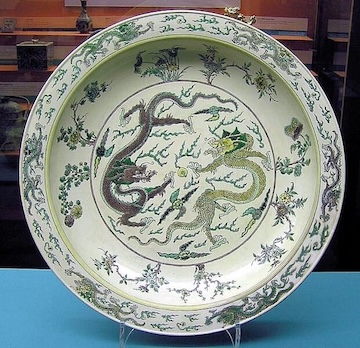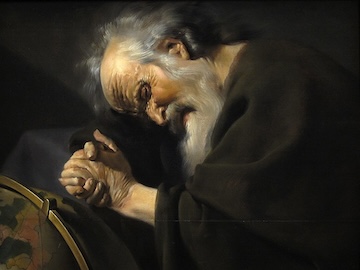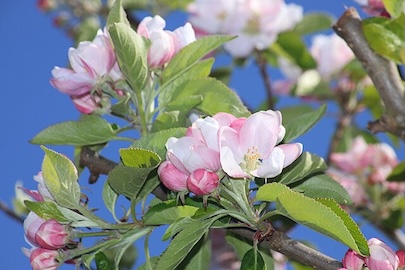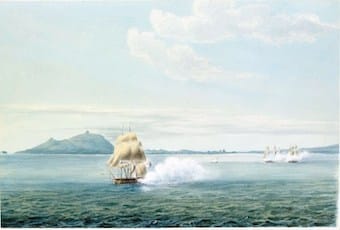A plate with dragons, from the Kangxi period of China (1662-1722), roughly contemporary with Charles II to George I in England. Examples of Chinese porcelain found their way to Europe as early as the fourteenth century, but it was the sixteenth-century Portuguese who began the export of Chinese porcelain to Europe on a commercial basis. At first, the patterns were in blue-and-white only, hence Field’s remark about the plate ‘looking blue’ with dismay, but during the eighteenth century a wider range of colours appeared.
The Chinese plate looked very blue,
And wailed, “Oh, dear! what shall we do!”
But the gingham dog and the calico cat
Wallowed this way and tumbled that,
Employing every tooth and claw
In the awfullest way you ever saw —
And, oh! how the gingham and calico flew!
(Don’t fancy I exaggerate!
I got my views from the Chinese plate!)
Next morning where the two had sat
They found no trace of the dog or cat;
And some folks think unto this day
That burglars stole the pair away!
But the truth about the cat and the pup
Is this: They ate each other up!
Now what do you really think of that!
(The old Dutch clock it told me so,
And that is how I came to know.)
From ‘The Duel’, as given in ‘Love-Songs of Childhood’ (1896) by Eugene Field (1850-1895). Field’s dedication is dated 1894.
Questions for Critics
1. What is the author aiming to achieve in writing this?
2. Note any words, devices or turns of phrase that strike you. How do they help the author communicate his ideas more effectively?
3. What impression does this passage make on you? How might you put that impression into words?
Based on The English Critic (1939) by NL Clay, drawing on The New Criticism: A Lecture Delivered at Columbia University, March 9, 1910, by J. E. Spingarn, Professor of Comparative Literature in Columbia University, USA.
Précis
As the hours passed, the air was thick with fur and the blows became increasingly wild. When dawn broke, nothing was to be seen of dog or cat. Some speculated that burglars had taken them, but Field claimed his two eyewitnesses — the clock and the plate — had assured him that the two silly animals had gobbled one another up. (59 / 60 words)
As the hours passed, the air was thick with fur and the blows became increasingly wild. When dawn broke, nothing was to be seen of dog or cat. Some speculated that burglars had taken them, but Field claimed his two eyewitnesses — the clock and the plate — had assured him that the two silly animals had gobbled one another up.
Variations: 1.increase the length of this precis to exactly 65 words. 2.reduce the length of this precis to exactly 55 words. 3.introduce one of the following words into the precis: about, because, despite, must, not, ought, whereas, whether.
Archive
Word Games
Sevens Based on this passage
Suggest answers to this question. See if you can limit one answer to exactly seven words.
Variations: 1.expand your answer to exactly fourteen words. 2.expand your answer further, to exactly twenty-one words. 3.include one of the following words in your answer: if, but, despite, because, (al)though, unless.
Jigsaws Based on this passage
Express the ideas below in a single sentence, using different words as much as possible. Do not be satisfied with the first answer you think of; think of several, and choose the best.
Spinners Find in Think and Speak
For each group of words, compose a sentence that uses all three. You can use any form of the word: for example, cat → cats, go → went, or quick → quickly, though neigh → neighbour is stretching it a bit.
This exercise uses words found in the accompanying passage.
1 Face. So. Tumble.
2 Gingham. Litter. They.
3 Get. Side. State.
Variations: 1. include direct and indirect speech 2. include one or more of these words: although, because, despite, either/or, if, unless, until, when, whether, which, who 3. use negatives (not, isn’t, neither/nor, never, nobody etc.)
Add Vowels Find in Think and Speak
Make words by adding vowels to each group of consonants below. You may add as many vowels as you like before, between or after the consonants, but you may not add any consonants or change the order of those you have been given. See if you can beat our target of common words.
mnts (7+2)
amenities. amounts. emanates. mints. minuets. minutes. mounts.
manatees. mantis.
Post Box : Ask Nicholas
Grok : Ask Grok
You are welcome to share your creativity with me, or ask for help with any of the exercises on Clay Lane. Write to me at this address:
See more at Post Box.
If you like what I’m doing here on Clay Lane, from time to time you could buy me a coffee.
Buy Me a Coffee is a crowdfunding website, used by over a million people. It is designed to help content creators like me make a living from their work. ‘Buy Me a Coffee’ prides itself on its security, and there is no need to register.
Related Posts
Picture: By Johannes Moreelse (?1602-1634), Wikimedia Commons. Public domain.. Source.
Posted February 24
Vice is a fact of life, wrote Pope, and God can even bring good out of it; but vice is never a virtue and in tackling vice together we make our society stronger.
Picture: © Sailko, Wikimedia Commons. Licence: CC BY-SA 3.0.. Source.
Posted June 8 2021
Robert Browning, aboard ship in sight of Gibraltar, reflects on the momentous events in British history that have happened nearby.
Picture: By Thomas William Ogilvie McNiven (1792-1870), via Wikimedia Commons. Licence: Public domain.. Source.
Posted May 7 2020






